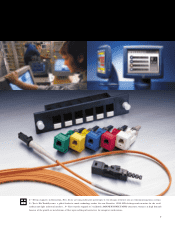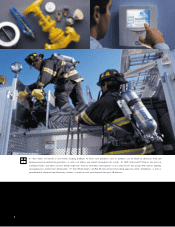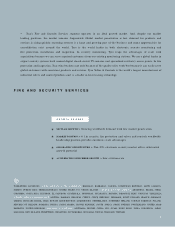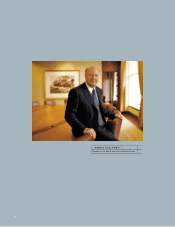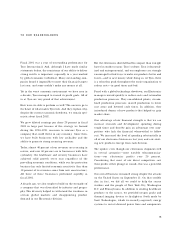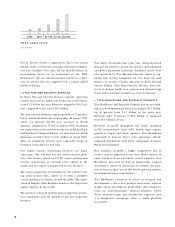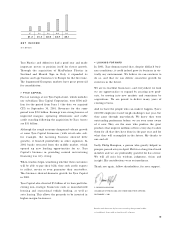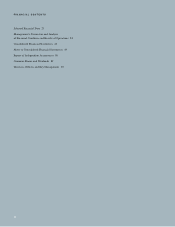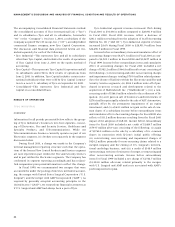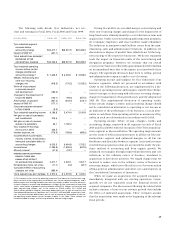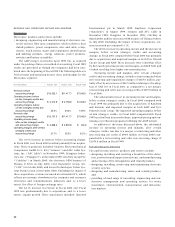ADT 2001 Annual Report Download - page 19
Download and view the complete annual report
Please find page 19 of the 2001 ADT annual report below. You can navigate through the pages in the report by either clicking on the pages listed below, or by using the keyword search tool below to find specific information within the annual report.
17
Since 1990, it has grown pre-tax earnings at about a 15
percent annual rate without a single down year. That’s
Tyco’s kind of company.
Tyco Capital is the leader in U.S. factoring, construction
equipment financing, Small Business Administration
loans and vendor financing (when a company leases
computers from Dell, Tyco Capital handles the financing
package). All are compelling growth markets.
But there’s more to the story. Owning a large finance
company bolsters Tyco’s other businesses in several
ways. From an internal perspective, the presence of Tyco
Capital allows us to become more capital efficient. From
an external perspective, owning a finance unit gives us a
competitive advantage when selling ADT products and
Tyco Infrastructure Services offerings to our customers
who meet the credit quality requirements of Tyco
Capital. In addition, we have already made Tyco Capital
a much more efficient operator by cutting its annual
costs by $150 million—triple our initial expectations—
and by exiting in excess of $5 billion worth of non-
strategic businesses. Finally, because Tyco Capital gained
a strong parent when we acquired it, its borrowing costs
have declined and its profit margins improved.
>TYCO ELECTRONICS
Tyco’s Electronics segment performed well in a tough
environment, as operating income grew 20 percent to
$3.3 billion, up from $2.8 billion last year. Sales for the
group totaled $13.1 billion, compared to $11.4 billion in
the prior year.
Tyco Electronics’ products gained share across the board,
with especially large increases in the automotive and
wireless markets. New products accounted for a large
portion of revenues and should play an even more
important role in fiscal 2002. Recent introductions
included a new automotive radar sensor to further
improve driver and passenger safety; an electrical distri-
bution box system for the automotive market; chip carri-
er sockets for Intel’s Pentium 4 processor; and intercon-
nect products for Sony’s Memory Stick and PlayStation 2.
We remain confident about the long-term growth of the
electronic components business. Cellular phone demand
should rise with the rollout of 3G technology and the
quantity of electronics in the typical automobile will
continue to increase relentlessly.
At TyCom, our telecommunications unit, operating
income was $415 million, compared to $530 million
last year. Revenues were $1.9 billion, compared to $2.5
billion in the prior year. (In October, we announced that
we had reached an agreement with the TyCom board of
directors to acquire all outstanding shares of TyCom that
we did not already own. We did this because we believe
that TyCom represents a compelling value.)
In June, TyCom successfully completed Phase 1 of
the TyCom Global Network (TGN), from the United
States to Europe, ahead of schedule and $1 billion under
budget. It began recognizing revenue that month.
The Phase 2 link to the Pacific is on schedule
and also under budget. When completed in 2002, the
TGN will be the most technologically advanced network
in the world.
Trans-Atlantic pricing has fallen more rapidly than
we anticipated, although it has stabilized recently.
Prices in the Pacific have not declined nearly as much.
These lower prices have meant disaster for some
competitors, especially those with highly leveraged
balance sheets. Some have already gone bankrupt, while
others are close to the brink. This shakeout—which
TyCom managers long expected—has convinced some
casual observers that no one will ever make money in
this market.
REVENUES
$ in billions
97 98 99 00 01
$16.7 $19.1 $22.5 $28.9 $36.3


